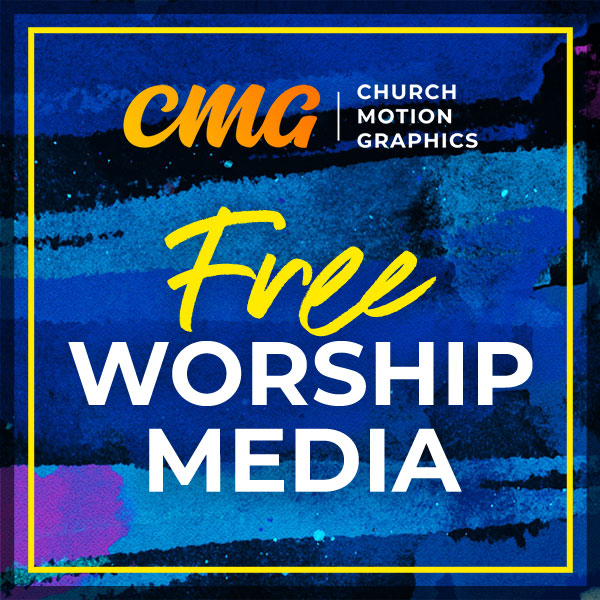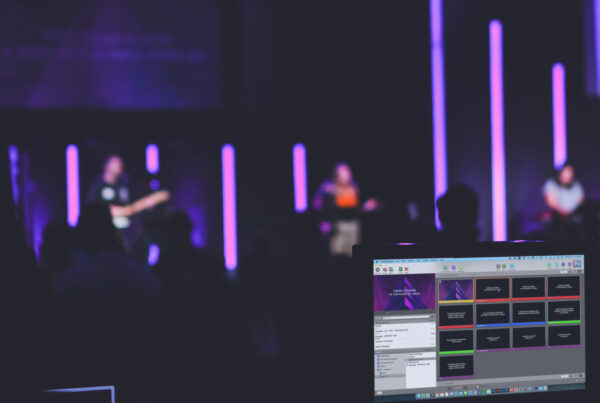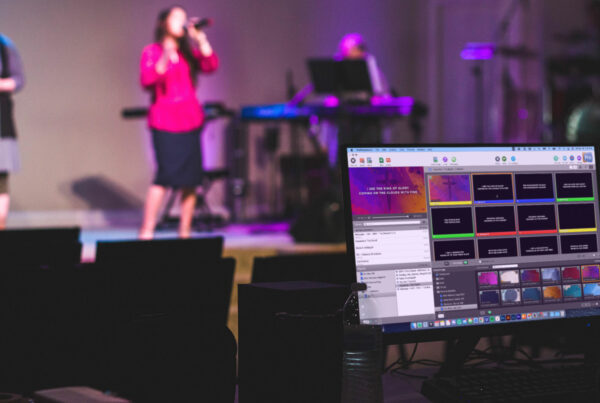Dealing with copyright regulations is not exactly the most fun part of Church Media, but it is an important one. In the same way that purchasing a song from iTunes ensures that an artist is properly compensated for their work, proper CCLI etiquette guarantees a paycheck for worship artists.
Ignoring the required fees, reporting, and other guidelines required by Christian Copyright Licensing International is just as illegal as downloading bootleg mp3s. As followers of Christ, we must have integrity in these matters—even when it’s inconvenient.
Here are seven things that you’ll need to know:
1. It’s Illegal To Display Copyrighted Lyrics Without A License
If you’re projecting lyrics for songs outside of hymns, this is a big one. This is not a rule that CCLI created to make money off of your church; it is an industry standard that applies to all music unless declared as public domain. It’s fair. For a comparison, imagine creating an original idea and having organizations all over the world displaying it in their gatherings as their own without giving you any credit. You can purchase a Church Copyright License based on your church size here.
2. You Must Display Copyright Info For Each Song
For each copyrighted song that you project lyrics for in your service, it’s required that you display proper information. This can be done several ways. A popular method is to display it directly on the song slides (on the first slide, last slide, or throughout the whole song). This is the easiest method because all church presentation software have this capability built in. However there are two other options that I’d recommend over this distracting method. You can create a single slide with all of your song info to show at the end of your service or include this information in your bulletin. Copyright info for each song should look like this:
“Hallelujah,” words and music by John Doe
© 2000 Good Music Co.
Used By Permission. CCLI License #______________
3. Audio and Video of Your Service Can Be Sold Legally
Through your CCLI license, you are permitted to record and sell both audio and video of your services (including your worship sets). However, if you’re going to include copyrighted music on the CD or DVD, there are a few limitations. You cannot sell more copies per year than your reported church size and no more than 15% of the church size of each service recording without additional payment. You may charge up to $4.00 per CD or $15.00 per DVD to cover your costs. With these limitations, it may be easier to not include the music segment of your service in your recordings if you’re hoping to sell copies as a fundraiser.
4. Additional Coverage Is Needed For Online Use
Many churches have already begun to stream or archive their pastor’s sermons on their website or podcast, but haven’t been sure about the legal implications of including their music. Whether webcasting audio or video of your worship, an additional license is needed to keep you clear of copyright infringement. You can find more information on this license here.
5. Additional Coverage Is Needed To Show DVD Clips
Including short video clips from popular movies is a great way to illustrate a point in a sermon. However, special permission to use these clips is required due to the regulations on DVD and Blu-Ray discs. Fortunately, these rights can be easily obtained through a Church Video License. You can purchase a video license based on your church size here.
6. Reporting Is Necessary
Occasionally, CCLI will contact your church to gather information on how you’re using the copyrighted music that you’ve gained access to through them. This is normal and should be expected about once every 2.5 years. They usually require reporting on which songs you’ve used for about a six month period. To be prepared for these reports, I recommend keeping a log of the songs you’ve projected. (This is also a valuable asset to the worship team to ensure they’re including enough variety in their song selections.)
7. CCLI Is On Your Side
There are a lot of opinions about CCLI and, quite frankly, most of them are bad. But, if you think about it, it’s the copyright rules that are frustrating—not CCLI. They did not create all of the hoops you must jump through and aren’t out to take all of your church’s money. In fact, they have worked hard to provide churches with a simple solution so that you are cleared to do ministry and not have to worry about the legal side of things.
Find out more:
CCLI Website
Official Guidelines
Church Copyright License (For Projecting Lyrics)
Church Streaming License (+ Online Service Archive)
Church Video License (For Showing Video Clips)












One idea we’ve had to display copyrights is having one slide after the service with the song name followed by the copyright, all on one slide. For us, that seems to be then best scenario. Thanks Kendall!
Wonderful! While I was studying for Church Music and Music Ed degrees they pounded the copyright laws into us because schools and churches are the most vulnerable places. The fines are astronomical and in many cases the penalties are per occurrence (i.e. each copy of music or each time the song was used).
Excellent information!
On number 6 you mentioned keeping a log of used songs. Any tips on how to best go about that?
Thanks!
Hey, Micah. A good way to keep up with this is through Planning Center. There is a feature you can enable to keep track of all copyrighted material usage.
I don’t use Planning Centre, but I do use a free music church music organiser (by donation), which saves all the lyrics, displays songs (also videos, powerpoints), and also helps schedule worship services and meetings, automatically uploads usage to CCLI and keeps a log of song use. I can run a report on the last 6 months of use, and also run a report on when and which worship leader has used certain songs. Pretty handy for working out what songs are potentially being over used, and whether too many new songs are being introduced at once.
In my 20 plus years of reporting to CCLI, we have never been asked for a report as described in no.6, or to demonstrate what our usage has been, so the information I gather and keep is pretty much used for our own benefit atm.
Great blog! Thanks. Are point 3 and 4 US only or also internationally applicable?
Hi, Jorrit—That’s a good question. To be honest, I’m not sure that any of the CCLI licenses will cover churches outside of the US. You should check their website, but I’m fairly certain that I saw that on there.
I hope that helps a little!
Kendall Conner
I live outside the US, and we use the NZ CCLI. For our region (Asia Pacific) there is licencing almost the same as in the US. Pricing differs of course. No. 3 above is included in our standard copy license, but I can’t find anything about online use/coverage on our region site.
What I noticed from our region CCLI guidelines is that they are not as comprehensive or prescriptive as the US region. When I have had a query, I have contacted CCLI directly (e.g. requirements for licensing for a combined churches event) they have been very quick to respond, and helpful.
“If you’re projecting lyrics for songs outside of hymns, this is a big one.” It is a big one. This is the issue that blows this whole discussion wide open and makes it not some case closed issue. For example, all hymns had writers but where not forced to “copyright” their music to make sure “they got paid for it” or that church’s had to make sure they where protected, What!? The word of God is free! And anything that flows from it (in the form of lyrics) in the place of worship, is free. All hymns get their inspiration from the word of God. Modern day worship artists would like to say the same thing, but then all of a sudden some company can sue you for singing their songs (note, not pirating their songs, but just singing them). You cannot equate illegally downloading music (which is wrong) with just displaying the lyrics for people to sing. Im all for supporting artists, thats why you buy their album. Just imagine if John Newton was tangled up in this…..so depressing. Furthermore, lets look at the lyrics from a Matt Redman song, “Better is one day in your courts than a thousand elsewhere” Now what part of these lyrics came from Matt Redmans own inspiration. None. Its word for word straight out of Psalm 84:10. So, not the artist nor some huge licensing company like the CCLI can sue you for, or claim rights to this material in this way. Its the word of God! And its free–just like the Gospel! Can these people sell their worship CDs for money? (which they do in the lobby anyway, which is supper cornball.) Of course they can and do a lot. But not them, nor anyone else can charge you, or sue you for singing them in a church that doesnt charge you to get in. I rest my case :D
O and its not illegal to sing a karaoke song either…sound familiar.
Because many translations of the Bible are copyright protected (NIV, MSG, etc) we can just say that the Word of God is free just in its original form or in a public domain translation… If you take the lyrics out of a song, you don’t have a song any more. It’s just poetry, like all the Psalms nowadays because of the missing melodies — and how I which that David and the other psalmists knew how to use Finale, Sibelius or any other music software so that we could sing their “poetry” today! :-)
The blend of music notes and chords and rhythm and original lyrics and even any adaptation of the Scriptures creates an unique work, and this is what is protected by the law. And considering many contemporary “worship” songs, we should be thankful that they continue to use God’s words in their songs.
But you are right, it’s a wide open discussion! Thank you for sharing that, Cain.
Blessings!
Cain, that’s not true. Most hymns are public domain, not because they’re derived from scripture but because their writers are dead and have been for a very long time. Copyright is listed in the constitution (1787). It’s not something created in the 1980s by worship artists.
The terms and registration guidelines have changed but both Kesus and the Apostle Paul said “the worker is worth his hire.” Artists should be paid.
Btw, there are hymns from the early 20th century (1920s) that are still under copyright because of the way the laws were changed…before the first chord from a worship song writer was ever heard.
That should read “both Jesus and…” Sorry for the typo.
Artists shouldn’t be paid just because someone sings a song they wrote. That’s ludicrous. Go read the copy right law sir, you are grossly mistaken.
You da man. And you are correct sir.
I absolutely agree with you Cain. Whoever made this blog is probably being funded or was paid by CCLI or just agrees with them without doing some research. The copyright law is clear and CCLI is lying to all of its subscribers. It’s just another business trying to make money. If we want to get technical, does CCLI or thr artist regularly give tithes and offerings? Giving to God what is His? After all, everything or any increase that is given to anyone is a blessing given by God. (That includes talents and abilities) – Is singing or song writing or playing an instrument a talent or blessing? Hmm…
CCLI can keep grubbing for money, but they won’t get mine.
On number two, is it the license number of the song, or your church’s own CCLI number? Thanks!
Hi, Jake. It’s your church’s number. Thanks for getting involved in discussion!
Kendall Conner
Great post. I love CCLI and what they allow my church and our administrators to do very easily! Their products and services are a GREAT resource for the church and we should be super thankful for them.
The license fees you will pay are miniscule compared to the time, effort, energy and money you would have to spend obtaining permissions and licensing to allow you to do what you do legally.
Worship leaders – quit complaining about having to do this! It is the law and publishers are well within their rights to sue your church for violations. Their job is to make sure songwriters are compensated fairly for the work they do, your job is to make sure that you church doesn’t go bankrupt because you have some personal agenda against copyright compliance.
Well said!
AMEN! I was asked to help with the reporting to CCLI for this last six month reporting period, and I was about as newbie and newbie comes. I got a smattering of explanation, and I certainly had even less understanding – until I delved into the CCLI website and – wow! did I get my questions answered. When I called CCLI they were super, super helpful. We are a small church, with a LOT OF MUSICAL TALENT, but did we know, for instance, that we should not be recording onto our “Service CD” a worship performance done by a soloist, for example, who was singing to an accompaniment track CD? Not really. Now we know and the sound guy knows to ‘turn the recording machine OFF’ when that occurs. Just one little tidbit in the milieu of new information being assimilated by this newbie. What this tells me, is that a broader communication over all between the church admins, the music dept., and the audio-visual guys, needs to take place re: copyright issues and what CCLI can and does do for the church….and what we need to do to fulfill copyright issues at large.
Hey there, just wanted to share my thoughts here too. A lot of interesting points brought up. Thanks Kendall for your post. I have recently been asked to do our 6 month reporting at my church and similar experience for me, I had no idea what to do, or much about ccli at all, and I am one of our 3 worship leaders there! I found their steps to be easy and helpful, I found that if I didn’t understand something, the answers were just a click away. I have learned a lot through ccli and have found them to be helpful. I am sorry if others have had a bad experience with ccli, but don’t knock it. The law is the law and I believe ccli is a blessing in so many ways to help all of us. I also have an appreciation for ccli, being in the beginning of becoming a song artist myself, I have done a lot of reading and research, and have realized that ccli has really done both worship leaders (churches entirely actually) and song writers and publishers a great service. I mean on the church’s side they have done the hard part by creating a database of over 300,000 worship songs worldwide (including digital, printouts, chord charts, lyrics, mp3’s, even translations now), making a negotiated agreement with song writers and publishers for us so we dont have to take the time to resreach, track down, contact, and pay other publishing companies etc which enables us to ‘copy the right’ of these songs to bless our church with waaaayyy less money. In am artists shoes, sure maybe the best way of generating income is to sell off your own pbco but if you are looking to broaden your horizons with a guaranteed partner, ccli is legit anf has proven to provide such as well as income (which people can say may not be fair to song writers but if you really think about it, your songs sell as much as YOU put into them, not anyone else -unless you find a really good label co-, so if youre looking for someone else to sell your music and you don’t have a rarely found amazing label co, then ccli is really pushing you I’m the plus revenue wise. Also concerning the comment earlier about not making money from God’s word, I respect your thoughts here and have often come to this thought before, should I as a musician, or more specifically a servant of God in my area of calling which so happens to be music, be making money off of this? However I think by the end of the day the answer is, sure why not? Yes it is am act of service, no it is not why I am doing this, BUT if God wants to bless me for bringing Glory to His name then who am I to tell him no? Also, I believe God is my provider and no money is not my only provision, but he knows what I need, and money just so happens to be part of that in life. I do not believe being paid to play is my goal, no. Bringing glory to the name of Jesus and sharing hope to the hopeless is my heart’s desire. And if God wants to bless me in the process, then hallelujah God is good! :) Be blessed everyone! :)
Thanks for adding to the conversation, Jocelyn. Great thoughts here!
Greetings!
A question. When you said have either a slide with the info OR have it in the bulletin.
Is it an either/or? or both/and?
We have a space at the end of the printed bulletin with all the copyright info, but have not done that on the slides.
thanks for you help
karl koeppen
Hi, Karl –
It could go either way, just as long as it’s in ONE of them! :)
Good stuff here.
A quick note on #5: currently there is not a license available that allows you to play a movie clip online. So if you are streaming your services, you must “black out” the video of the clip, or omit it completely.
After reading US copyright law carefully, I find this section a little curious:
—————————————————-
§ 110 . Limitations on exclusive rights: Exemption of certain performances and displays
Notwithstanding the provisions of section 106, the following are not infringements of copyright:
(3) performance of a nondramatic literary or musical work or of a dramatico-musical work of a religious nature, or display of a work, in the course of services at a place of worship or other religious assembly;
——————————————————
It clearly states that both performance and display of religious songs in a worship service do not require permission from the copyright holder.
Can someone explain why everyone says that it’s illegal to display the lyrics of a song without a license?
Am I misreading that statute?
Thank you for posting this. I was going to post it and then scrolled down and saw you already had. You are not misreading the statute…why doesn’t CCLI have the law on there site? Because they want to mislead you to gain money.
Right here is the right ste forr everyone who hopes too find
out about this topic. You understand so muhh its almost tough to argue with you (not that I really would
want to…HaHa).You definitely put a brand new spin onn a topic that’s beenn discussed for a long time.
Great stuff, just great!
Thank you for your post. This is great information to consider. I really like that CCLI is there to protect churches. Like you mentioned, it can really help to take the worry out of having to deal with all the legal side of things. I can see how people might think that CCLI is bad, I only see it as a way to keep your church from having to face and legal issues.
Hey Kendall!
My tiny church (regular attendance 15-20) is considering getting ccli and cvli. I’ve read a lot about ccli and definitely see the value in the resources and the work that’s been done to make churches legal by using it. My question is ” Why are only 160,000 churches using it when there are millions of churches in the USA? I know you may not know the answer, but what are your thoughts on this?
Thanks for your time,
Mary
Question, if we have 200 hymbooks (they were donated to us) but only have 50-60 people that regularly attend the church, do we need CCLI license to project the lyrics of a copyrighted song?
The reason I ask is because we have legal copies of the music, more than the people in the church.
Thanks a lot!
I’m not sure about this, but I wouldn’t worry about it. Just throw it up there. (:
I’m going to stir the waters on this 3+ year old post. I called CCLI to clarify where copyright info for songs is required to be shown, not because of doubting you Kendall, but because my worship pastor wanted to know what CCLI had to say. The rep I talked with stated that it MUST be shown at least once during the actual performance of the song. The rep also said that showing the copyrights for all the songs at the end of the service on one slide, after the song has been performed, does NOT fulfill the terms of any of CCLI’s licenses. The rep was pretty clear about this: it must be shown during the performance of the song itself and be shown on the screen. But then the rep also said that CCLI won’t hunt you down for not showing it, and that they simply “appreciate it” if you fulfill the terms of the license (a bit of a funny way to encourage their customers to fulfill the terms, haha).
So, there it is, the “gray area” explained by CCLI.
Alex Miller is spot on in his comment dated October 4 – I have also have this discussion with CCLI and they made it clear that a slide pre-service or post-service absolutely did NOT meet the requirement and that they weren’t happy that this misinformation was being passed around in articles like this one. The copyright and CCLI number must be shown WITH the song when it’s performed/sung/lyrics are shown. Easy.
Will a church get caught? Not likely. Someone also may not get caught for stealing a candy bar at the store but does that make it permissible? Do the right thing because it’s the right thing to do. Period. Upstanding character!
I would encourage Kendall to update his piece to correct this misinformation. CCLI would likely appreciate it, too. Unfortunately some of the larger churches are doing this and it sets a bad example if you ask me.
I believe everyone needs to look at this about what the law truly is for music and churches. As long as your use meets the simple first-amendment-protected guidelines here, then you don’t need a worship-related license from anyone, not WorshipCast, OneLicense, LicenSing, CVLI, CCLI, Music Services, Word of Life, or anyone else. There much more about this.at:https://geniemusic.com/?w=1115
“CCLI Is On Your Side”
This is a bit of a Stritch. As CCLI lists things like popularity. If they were a ‘neutral’ service, this would not be there. They are a promoters too, it seems. So, how is the church supposed to be involved involuntarily in this action? Commercial Christianity.
One site calls CCLI an necessary evil. Seems right.